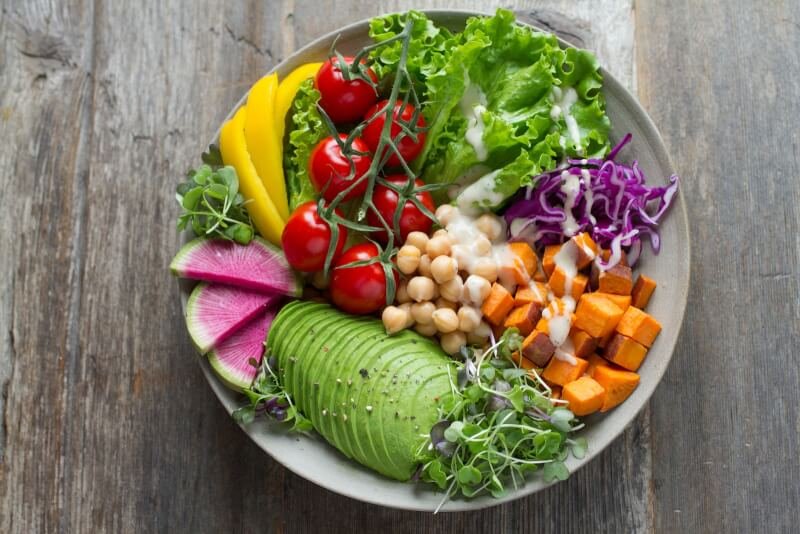If you’ve ever wondered what options are available for those following a vegetarian diet, look no further! This article explores a variety of tasty and nutritious meat alternatives that will satisfy even the most dedicated carnivore. From delicious plant-based proteins to flavorful substitutes, we’ve got you covered. So, whether you’re a seasoned vegetarian or simply curious about expanding your culinary horizons, prepare to be inspired by these mouthwatering meat alternatives that are sure to please even the most discerning palate.
Plant-Based Proteins
Plant-based proteins are a fantastic option for vegetarians, providing a wide range of nutrients and flavors. Whether you are looking to reduce your meat consumption or adopt a fully plant-based diet, there are plenty of options to explore. Let’s dive into some of the most popular plant-based proteins available.
Tofu
Tofu, also known as bean curd, is made from soy milk and has been a staple in Asian cuisine for centuries. It is an excellent source of protein and is incredibly versatile in cooking. Tofu comes in various textures, such as silken, soft, firm, and extra firm, allowing you to choose the consistency that suits your preferences. You can use tofu in stir-fries, soups, salads, or marinate and grill it for a delicious main dish.
Tempeh
Similar to tofu, tempeh is also made from soybeans. However, unlike tofu, tempeh is fermented, resulting in a nutty flavor and dense texture. It is a great source of protein, fiber, and probiotics, making it a fantastic addition to your diet. Tempeh can be sliced, marinated, and pan-fried to create a crispy exterior, making it a fantastic substitute for meat in sandwiches, tacos, or stir-fries.
Seitan
Seitan, also known as wheat meat or wheat gluten, is derived from wheat protein. It has a chewy and meat-like texture, making it a popular choice for those seeking a meaty alternative. Seitan is rich in protein and can be flavored and seasoned to mimic various meats. Use it in stir-fries, stews, curries, or marinate and grill it for a satisfying meaty experience.
Plant-Based Protein Powders
If you are looking for a convenient way to supplement your protein intake, plant-based protein powders are an excellent option. These powders are typically made from legumes, such as peas, rice, or hemp. They provide a concentrated dose of protein and can easily be added to smoothies, baked goods, or mixed with water or plant-based milk for a quick and nutritious shake.
Legumes
Legumes are an essential part of any vegetarian diet, offering a wide array of nutrients and flavors. These edible seeds or pods come in various shapes, colors, and sizes, providing versatility and diversity in your meals.
Lentils
Lentils are a fantastic source of plant-based protein, fiber, and essential minerals. They come in different varieties, including green, brown, red, and black, each with a unique texture and taste. From lentil soups and stews to salads and veggie burgers, lentils can be used in countless recipes, adding a hearty and nutritious element to your meals.
Chickpeas
Chickpeas, also known as garbanzo beans, are incredibly versatile legumes that can be used in both savory and sweet dishes. They are rich in protein, fiber, and complex carbohydrates, making them a filling choice for vegetarians. Chickpeas can be mashed to make delicious hummus, roasted for a crunchy snack, or used as the base for veggie burgers and curries.
Black Beans
Black beans are not only packed with protein, but they also offer an array of antioxidants and essential nutrients. These hearty beans are commonly used in Latin American cuisine and can be enjoyed in salads, soups, burritos, or as a filling for tacos. Their rich and earthy flavor adds depth to any dish, making them a popular choice among vegetarians.
Soybeans
Soybeans are a powerhouse of nutrition, providing a complete source of protein and essential amino acids. They are incredibly versatile and can be turned into different soy-based products such as tofu, tempeh, or soy milk. Enjoy soybeans boiled, steamed, roasted, or in the form of edamame for a healthy and protein-rich snack.
Peas
Peas may be small, but they are mighty when it comes to their nutritional value. These vibrant green legumes offer a good amount of protein, fiber, and essential vitamins. Peas can be used in soups, salads, stir-fries, or blended into a creamy pea soup. Additionally, pea protein powder is gaining popularity as a plant-based protein supplement.

Quinoa
Quinoa is a grain-like seed that has gained significant popularity in recent years, especially among vegetarians and vegans. It is a complete protein, meaning it contains all nine essential amino acids. Quinoa is incredibly versatile and can be used as a base for salads, side dishes, or even as a substitute for rice in various recipes. It has a slightly nutty flavor and a light, fluffy texture, making it a delightful addition to any meal.
Mycoprotein
Mycoprotein is a unique alternative protein source derived from fungi, specifically a type of filamentous fungus called Fusarium venenatum. It is rich in protein, low in fat, and contains essential amino acids. Mycoprotein has a meaty texture and can be used in a variety of dishes, from meatballs and burgers to stir-fries and casseroles. This lesser-known protein source offers a new and exciting option for vegetarians seeking diversity in their diet.

Nut and Seed Butters
Nut and seed butters are not only delicious but also pack a punch when it comes to protein and healthy fats. They can be enjoyed spread on toast, added to smoothies, or used as a dip for fruits and veggies.
Peanut Butter
Peanut butter is a classic and beloved nut butter that provides a good amount of protein, healthy fats, and essential nutrients. It works well in sandwiches, baked goods, or even as a topping for oatmeal or yogurt. Just make sure to choose natural peanut butter without extra sugars or additives for a healthier option.
Almond Butter
Almond butter is another fantastic option for a protein-packed spread. It offers a slightly sweeter and nuttier taste compared to peanut butter. Almond butter can be used in a variety of recipes or simply enjoyed on its own. Spread it on apple slices, mix it into smoothies, or use it as a base for homemade energy bars.
Cashew Butter
Cashew butter has a creamy and rich flavor, making it a delightful alternative to traditional nut butters. It is lower in fat compared to other nut butters but still offers a good amount of protein. Use cashew butter in dressings, dips, or enjoy it on toast for a satisfying and nutritious snack.
Sunflower Seed Butter
Sunflower seed butter is an excellent option for those with nut allergies or sensitivities. It provides a good amount of protein, healthy fats, and essential minerals. Sunflower seed butter can be used as a spread, incorporated into baked goods, or added to smoothies for a nutty and protein-rich twist.
Mushrooms
Mushrooms are a fantastic meat alternative, offering a unique texture and umami flavor that can be incredibly satisfying. They also provide various vitamins, minerals, and antioxidants, making them a healthy addition to any diet.
Portobello Mushrooms
Portobello mushrooms are often used as a “burger” patty for their meaty texture and savory taste. They can be marinated and grilled, then served on a bun with all your favorite toppings for a delicious and satisfying vegetarian meal. Portobello mushrooms are also fantastic when stuffed, roasted, or added to stir-fries and pasta dishes.
Shiitake Mushrooms
Shiitake mushrooms are not only tasty but also have several health benefits. They are known for their immune-boosting properties and rich, earthy flavor. These mushrooms can be used in a variety of dishes, from stir-fries and soups to sauces and risottos. Their meaty texture adds depth and complexity to any recipe.
Oyster Mushrooms
Oyster mushrooms have a delicate and mild flavor, making them a versatile choice for various culinary creations. They have a slightly chewy and tender texture, providing a satisfying alternative to meat in dishes such as stir-fries, tacos, or even as a topping for pizza. Oyster mushrooms can also be breaded and fried to make delicious vegan “chicken” nuggets or strips.
Egg Alternatives
Eggs are a common ingredient in many recipes, but luckily, there are plenty of alternatives for those following a vegetarian or vegan diet. Whether you are looking for a replacement in baking or want a satisfying breakfast option, these egg alternatives have got you covered.
Tofu Scramble
Tofu scramble is a popular egg alternative, providing a similar texture and appearance to scrambled eggs. Simply crumble firm tofu and season it with spices, such as turmeric, nutritional yeast, and black salt, to mimic the taste and color of traditional scrambled eggs. Add your favorite vegetables and enjoy this protein-packed breakfast option.
Chickpea Flour
Chickpea flour, also known as gram flour or besan, is an excellent substitute for eggs in savory recipes. It acts as a binder and provides a slightly nutty flavor to dishes. Chickpea flour can be used in recipes such as frittatas, quiches, or as a coating for vegan “egg” wash.
Flaxseed
Flaxseed is a versatile ingredient that can be used as an egg substitute due to its binding properties. Simply mix ground flaxseed with water and let it sit for a few minutes to form a gel-like consistency. This mixture can be used as a replacement for eggs in baking recipes, providing moisture and structure to your creations.
Aquafaba
Aquafaba is the liquid that remains after cooking or canning chickpeas. It can be used as an egg white substitute due to its ability to create a foamy and airy texture. Aquafaba can be whipped and used in recipes such as meringues, mousses, or as a substitute for egg whites in baking.
Vegetable-Based Alternatives
Vegetables themselves can often provide satisfying alternatives to meat, especially when prepared in certain ways. Here are a few vegetables that you can turn to when you’re looking for a unique plant-based protein option.
Eggplant
Eggplant, with its meaty texture and ability to absorb flavors, is an excellent choice for vegetarian dishes. Whether you grill, roast, or sauté it, eggplant can be used as a substitute for meat in dishes like eggplant Parmesan, eggplant stir-fries, or even as a filling for veggie tacos.
Zucchini
Zucchini is a versatile vegetable that can be transformed into noodles, “zucchini boats,” or even used as a substitute for meat in veggie burgers. Its mild flavor and tender texture make it an adaptable option for various recipes. Get creative with zucchini and explore the multitude of possibilities it offers.
Cauliflower
Cauliflower has gained significant popularity as a versatile ingredient in recent years, and for a good reason. It can be used to make cauliflower steaks, buffalo “wings,” or even cauliflower rice. This cruciferous vegetable provides a lighter alternative to meat in dishes while adding a unique texture and flavor profile.
Seaweed
Seaweed may not be the first thing that comes to mind when thinking about alternative proteins, but it is an excellent option for those looking to explore new flavors and nutrient-rich foods. Seaweed, such as nori, dulse, or kelp, is a fantastic source of minerals, vitamins, and protein. It can be used in soups, salads, sushi, or even as a seasoning to enhance the umami taste in various dishes.
Mock Meats
For those seeking a more familiar meat-like experience, mock meats are readily available and can help replicate the taste and texture of meat while providing a plant-based alternative.
Soy-Based Meat Alternatives
Soy-based meat alternatives, such as veggie burgers, sausages, or ground meat substitutes, have become increasingly popular and offer a wide range of options to satisfy your cravings. Made from soy protein, these products often provide a good amount of protein and are vastly available in stores or can be made using homemade recipes.
Vegetable Protein-Based Meat Alternatives
Vegetable protein-based meats, typically made from blends of legumes, grains, and vegetables, provide a nutritious and flavorful alternative to meat. These products often offer protein, fiber, and other essential nutrients, making them a great addition to your vegetarian diet. Options may include veggie meatballs, meatless strips, or plant-based deli slices.
Mycoprotein-Based Meat Alternatives
As mentioned earlier, mycoprotein derived from fungi has gained popularity as a meat alternative. Mycoprotein-based products offer a unique texture and flavor while providing protein, fiber, and low levels of fat. These products can be found in various forms, from nuggets and burgers to pieces that mimic the texture of chicken or beef.
By exploring these plant-based protein options, you can create diverse and enjoyable meals while meeting your nutritional needs. Whether you choose tofu, legumes, mushrooms, or any other alternative, incorporating these protein-rich foods into your diet can support your vegetarian lifestyle and leave you feeling satisfied and nourished. Remember to get creative in the kitchen and embrace the delicious world of vegetarian alternatives!


